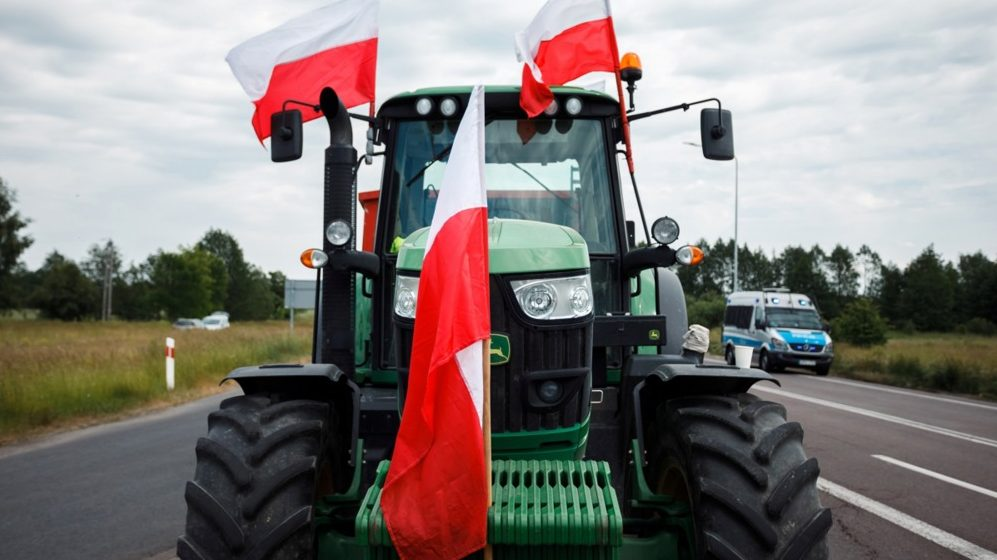The knotty problem of Ukrainian grain flooding Central and Southeast European markets is back on the agenda as Hungary and Poland both threatened they are ready to unilaterally reintroduce bans on Ukrainian grain imports after the current ban negotiated by the EU expires on Friday.
“Poland will not allow itself to be flooded by Ukrainian grain,” Polish Prime Minister Mateusz Morawiecki said in an election video published on Tuesday. “No matter what the Brussels bureaucrats decide, we will not be opening our borders.”
In the video, Morawiecki stressed that Poland had helped Ukrainians when needed, but that now the interests of Polish farmers must come first. With one month to go before the general election, the Polish government is neck-and-neck with the opposition in the polls and desperately needs the rural vote to win. But Polish rural voters, who typically back PiS, have grown increasingly disenchanted with the governing party, because of the Ukrainian grain issue and previously mismanagement of animal disease crises.
Hungary’s agriculture minister, Istvan Nagy, said his government had asked the European Commission to extend the ban on imports, which includes wheat and maize, but received no response. “Brussels is silent, so we have to act alone to defend our farmers,” he said.
In contrast to Poland and Hungary, the Bulgarian parliament voted on Thursday to lift the ban on the import of Ukrainian wheat, corn, rapeseed and sunflower seeds. The decision will be effective from Friday and the government, headed by Nickolay Denkov, is hopeful this will lead to a decrease in food prices.
In early May, the European Commission agreed a ban on imports of Ukrainian grains and oilseeds to five Central and Southeast European countries – Poland, Hungary, Slovakia, Romania and Bulgaria – after farmers in these countries protested that Ukrainian produce destined for foreign markets was actually remaining on domestic markets and pushing them into bankruptcy.
The five countries agreed to continue allowing the transit of Ukrainian food products, which became even more important after Russia quit a UN-brokered deal allowing Ukraine to export grain via Black Sea ports in July, and then started to bomb Ukrainian ports and grain storage infrastructure.
Nagy stressed that he and his Romanian, Bulgarian and Slovakian counterparts had earlier agreed that if Brussels was unwilling to extend the moratorium, they would act individually on a national basis. Hungary will continue to allow the transit of Ukrainian products because “we do not want to harm Ukraine, but we must preserve the competitiveness of our farmers.”
Gergely Gulyas, the minister in charge of the Hungarian prime minister’s office, said at his weekly press conference on Wednesday that “Ukrainian grain should go to starving African countries”.
“This is not a question of European solidarity – Ukrainian grain is destroying the markets of neighbouring countries,” he said.
On Tuesday, the Polish government passed a resolution which bans Ukrainian grain imports – except those transiting – past September 15.
“The resolution is aimed at the European Commission, so it decides to prolong the import ban,” Polish Agriculture Minister Robert Telus explained. “If the Commission won’t decide this way, we will surely pass an ordinance which blocks the access of Ukrainian grain into Poland.”
The other 22 EU member states are against extending the ban, though on Friday Politico quoted unnamed sources as saying that the Commission could extend the restrictions for another two months. “It’s all in Ursula’s hands now and she could do anything, but this is one of the options,” a senior EU official, referring to the Commission president, was quoted as saying.
On Tuesday, Ukrainian Prime Minister Denys Shmyhal warned that Kyiv might turn to the World Trade Organization (WTO) for arbitration if bans on his country’s produce are extended beyond mid-September.
“We have no intention of harming Polish farmers. We greatly appreciate the support of the Polish people and Polish families!” Shmyhal wrote on the social media platform X. “But in the case of a violation of trade law in the interests of political populism before elections, Ukraine will be forced to turn to WTO arbitration.”
Ukrainian President Volodymyr Zelensky thanked Bulgaria this week for its decision to lift the ban on Ukrainian grain imports. “I am grateful to Bulgaria for its decision not to prolong restrictions on Ukraine’s agricultural exports after September 15th. I thank PM Denkov and his team, as well as Bulgarian parliamentarians who supported this move. Bulgaria sets an example of true solidarity,” Zelensky wrote on X
Earlier this week, Bulgarian Agricultural Minister Kiril Vatev said that even though he had reservations about the lifting of the ban and highlighted he was not part of preliminary discussions on the matter, he ultimately supported the decision, adding that quality control will be implemented.
“We’ll increase control over all imports coming from Ukraine, especially in terms of radioactivity and the presence of heavy metal contents,” Vatev told the media, noting there would likely be opposition from local producers. “There are serious concerns on the part of agricultural producers because Ukraine is a powerful country in this segment. But the really legitimate concern is that Ukraine does not fulfil the tough requirements that are imposed by the EU in the production process.”
Source : BalkanInsight


